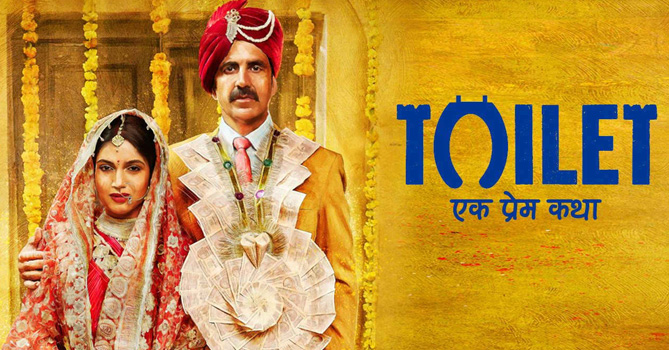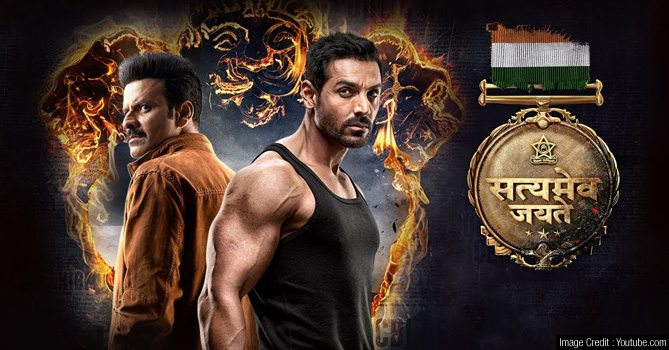Cast – Akshay Kumar, Bhumi Pednekar, Divyendu Sharma, Anupam Kher, Sudhir Panddey, Shubha Khote, Rajesh Sharma, Sana Khan
Directed and Edited by – Shree Narayan Singh
Produced by – Aruna Bhatia, Shital Bhatia, Prernaa Arora, Arjun N. Kapoor, Hitesh Thakkar
Written by – Siddharth Singh, Garima Wahal
Cinematography – Anshuman Mahaley
Background Score – Surender Sodhi
Production House – Viacom 18 Motion Pictures, KriArj Entertainment, Neeraj Pandey, Plan C Studios, Cape of Good Films LLP
Duration – 2 hours 35 minutes
Censor Rating – U/A
Genre – Satire, Social Issue
Art has always been a reflection of society, they say. We wonder why it took this long then for Bollywood to address one of the major public health crises that has been staring India in its face – the lack of public sanitation, of toilets, in most of the rural areas. According to recent statistics, over 490 million people are given to the practice of open defecation in India. According to the makers of Toilet Ek Prem Katha (TEPK) this is merely a conservative estimate. Why did it take so long for film makers (who have routinely taken up the issue of women’s emancipation) to touch upon this subject? Embarrassment could not possibly be the reason, for what could be more embarrassing than the very existence of open defecation in a progressive country such as ours? Commercial interests, perhaps. No one thought that a movie about Toilets would become a Box Office success. And it perhaps may not. But this does not take away the success of TEPK.
A Simple And Complex Tale
TEPK is at once a simple and complex story. Middle aged Keshav (Akshay Kumar) is the village bicycle salesman who falls in love with Jaya (Bhumi Pednekar) an educated young girl. The couple wed but Jaya is shocked by the practice of open defecation in her marital home. She leaves refusing to return till she has a toilet. Initially unwilling to understand and take a stand, Keshav is transformed by his love and sets out to build a toilet and save his marriage. The villagers are vehemently against the idea of constructing the “unholy” toilet within the home and Keshav is soon up against his father (Sudhir Pandey), society, and corrupt officials.
Sounds simple enough, right? It is here that we need to take a closer look and TEPK will reveal many more layers.
We speak of patriarchy, of oppression, in rather loud tones. A woman need not be tortured to be repressed. Something as simple as denying her the privacy to finish her ablutions can be one of the worst forms of oppression. Not bothering to understand why a woman cannot fall in line and give up this demand even to save her marriage and her beloved is a colossal failure on our part.
To create a context for Keshav’s transformation from one who follows the herd to a champion of a woman’s rights, director Shree Narayan Singh had to come up with a love story. This does tend to bore the audience who are here to watch a strong social critique or perhaps even to enjoy some toilet humour but it is an indispensible part of the plot.
Unlike most other families in the country, Jaya’s family does not force her to get back and “adjust”. Instead they let her stand firm in her demand and that, perhaps, is her greatest victory.
For over seven decades we have consistently blamed the government, civic authorities, corrupt politicians, and just about everyone else for the lack of public toilets and sanitation in the country. The blame, however, lies squarely on our own shoulders. We have not demanded what should have been a basic right; we have failed to look beyond shameful practices in the name of culture; we have failed to utilize whatever resources the government has provided us over the years; we have allowed health and hygiene to take a back seat.
What’s Good, What’s Bad?
News reports suggest that the film was offered to many heroes in Bollywood before Akshay signed up. No one could have done the role more justice and carried off both the humour and the seriousness of the theme with more élan. TEPK is, however, not all Akshay. Bhumi Pednekar steals the show. Her portrayal of a simple, a light hearted, romantic, yet sensible young girl is a class act. Her chemistry with Akshay is brilliant. Bhumi comes across as a real person – an actress we want to see on screen time and again. She’s not a size zero, dolled up silver screen diva who depends on her accent or dancing skills or even her make up to look good. Bhumi’s expressions, her earthy performance, are quite enough for us to fall in love.
The supporting cast of TEPK – illustrious names including Sudhir Pandey, Anupam Kher, Shubha Khote, and Divyendu Sharma – have done the film full justice. Most of the film has been treated with a light, humourous touch that does not weigh down the audience, not is it preachy.
The music is melodious and fresh. “Gori Tu Latth Maar” composed by Manas Shikhar and sung by Sonu Nigama and Palak Muchhal is one song you’ll keep coming back to for a while.
TEPK does tend to drag, especially in the first half. Though we understand the context, the romance tends to overshadow the real issue. The greatest complaint one can have is that the climax somehow seems to fizz out. We keep waiting for Keshav’s fight to turn into a deluge, for millions to join the struggle, for a mass resolution. Unfortunately, what starts out looking like a “one man sparks revolution” plot falls flat and ends with only his own personal success. This is a bit of a letdown given the hype and attention the film is certain to receive. Shree Narayan Singh is a good director but does not make a good editor.
Our Verdict
Book your tickets and head to the movies this weekend. TEPK is a film worth watching. For the sheer courage of the storyteller and for the very lovable acts of Akshay and Bhumi. If nothing else, to understand the plight of millions of women across the country.
Rating – ***
Related Information





